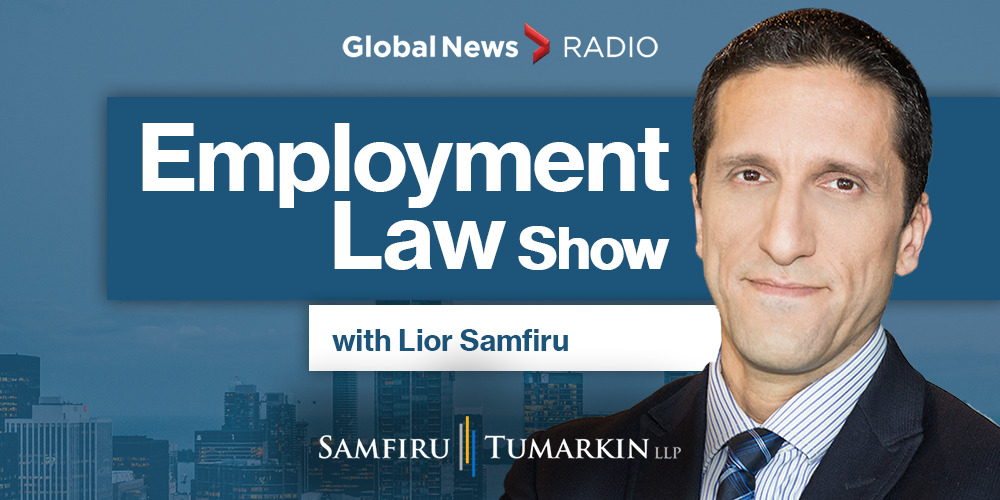Employment Law Show 640 Toronto – S7 E76

Summary
Everything you need to know about employment contracts, off-duty conduct, severance for salespeople, changes to terms of employment, and preparing for an expected termination.
Lior Samfiru is a Toronto employment lawyer and Partner at Samfiru Tumarkin LLP. He reveals your workplace rights in Ontario on The Employment Law Show. Lior shatters myths and misconceptions about severance pay, terminations, workplace harassment, overtime pay, wrongful dismissal, constructive dismissal, duty to accommodate, and more.
What We Covered
Should severance pay for salespeople include commission?
1:34 – An individual was a commissioned salesperson with a modest base salary of $30,000. With commissions he made over $100,000. He was let go from his job after the company lost a client. He was offered 6 weeks of severance pay after 3 years of service, calculated based on his base salary. Lior explained how much severance pay he was actually owed, and how to properly calculate severance pay for salespeople.
Can off-duty conduct result in a termination for cause?
3:45 – An individual was charged with public intoxication over a weekend during personal time. His employer found out about the incident, and was upset that they were never informed about the incident. He was terminated for cause. Lior explained why the individual should not have lost his job.
Learn more about off-duty misconduct.
Why are Employment Contracts so important?
7:27 – Lior explained why employment contracts are so important for both employees and employers. They are one of the most important documents you will ever sign, as they contain vital information about your employment rights and entitlements.
Is it better to have an employment contract or no employment contract?
8:26 – If you are an employee, you are far better off not having an employment contract when you start new employment. Employment contracts often limit your rights and severance pay entitlements. Employers, on the other hand, are much better off having their workers sign an employment agreement.
What parts of an Employment Contract are most often overlooked?
10:52 – Most people expect an employment contract to contain information about salary, benefits, bonus and vacation time and pay. People rarely look for more crucial aspects of the agreement, such as a termination clause that seeks to limit the amount of severance pay they are owed upon termination of employment. An employment contract may also contain a non-competition clause that attempts to limit your ability to work in the industry after you lose your job. Some agreements also contain wording concerning the employer’s ability to put you on a temporary layoff, or change the terms of employment.
Can an Employment Contract be negotiated?
14:04 – In most cases the terms and wording of an employment contract can be negotiated. Employees can often have aspects of the contract changed. Lior explains the best tactics to use when attempting to work with a potential employer to make the employment contract a more balanced document for both parties.
Can your employer ask you to sign an Employment Contract after you’ve already started working?
17:07 – Employment contracts are not necessary for an employee and employer to start a working relationship. However, some employers will attempt to have their staff sign an employment agreement after the start working. This documents would only be enforceable if the employer provides something to the employee in exchange for their signature. An employee cannot be penalized or punished if they decide not to sign an employment contract.
Temporary Layoffs are actually considered terminations of employment
21:13 – In most cases, if an employer puts an employee on a temporary layoff, the employee can treat their employment as being fully terminated, and seek full severance pay in response.
Is an employer allowed to change your terms of employment?
22:29 – If an employer makes drastic changes to your employment, such as a reduction in pay or hours of work, demotion, removal of job duties or a move to a new office location, you can treat your employment as being terminated via a constructive dismissal. In those cases, you can leave your job with full severance pay.
Does an employer have the right to suspend an employee without pay?
25:56 – Employers may not realize it, but they do not have a right to suspend a non-unionized employee with pay. Doing so could lead to a constructive dismissal situation. The only time a suspension without pay may be valid is when the worker gives their employer permission, usually through an employment contract.
What happens when a company is sold?
27:27 – When a company is sold to a new owner, the employees of the old company have the right to treat their employment as being terminated and collect severance pay. If the new owners offer a job to an employee, and the employee rejects it, the amount of severance pay they are to receive will be reduced.
LEARN MORE
• Sale of a company in Ontario: Employee rights
• Company sold in Alberta: Who pays severance?
• Rights for employees when business sold in B.C.
Am I owed severance if I can’t return to work because of a medical condition?
32:56 – A frustration of contract may occur when a medical condition or injury prevents you from returning to your job. In a frustration of contract, your employment will be treated as being terminated, and minimum severance pay will be paid to you.
I believe I am about to be let go. Can I do anything to prepare for it or change the outcome?
34:18 – Lior explains what your options are when you believe your employment will soon be terminated.
Experiencing an Employment Issue?
Before you call a lawyer, use the Pocket Employment Lawyer to find out if you might have a case.
Use The Severance Pay Calculator to find out how much severance pay you may be owed upon termination.
Call 1-855-821-5900, email Help@EmploymentLawyer.ca or fill out a contact form to get help now from a Toronto employment lawyer.
Denied Long Term Disability? We Can Help.
Discover your rights when your Long Term Disability Claim is denied. Find out more here.




